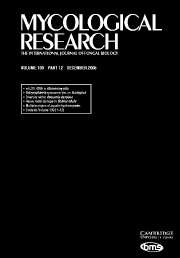Article contents
The influence of substrate and temperature on the sporulation of Fusarium avenaceum and its virulence on marsh reed grass
Published online by Cambridge University Press: 01 September 1999
Abstract
Various substrates and temperatures were evaluated for their effect on the sporulation and virulence of F. avenaceum, a potential biological control agent for marsh reed grass (Calamagrostis canadensis). Prior to assessing sporulation, growth was optimal on potato dextrose agar (PDA) between 15°–28°C, and minimal on malt extract agar (MEA). Temperature predisposed sporulation of 15 d old cultures, with refrigeration of PDA stock cultures of 4° causing a nearly ten-fold decrease in sporulation. Sporulation increased when PDA was juxtaposed with MEA or vice versa. In juxtaposed media, inoculation with MEA stock cultures significantly reduced macroconidial production. Although juxtaposition of MEA with PDA enhanced conidial production, there was no clear relationship between maltose-based substrates and conidial abundance. In 30 d old cultures, sporulation levels were higher when daytime temperatures were 30° versus 20°. The high daytime temperature also caused a greater proportion of macroconidia to form, and lowered the abundance of mesoconidia. In comparisons of bag cultures incubated at 20°, inoculum produced on puffed wheat was twice as virulent as that produced on marsh reed grass straw amended with malt extract. Mesoconidial production was maximal (2·6×108 mesoconidia g−1) using a 1:1 mixture of puffed wheat and wheat straw with malt extract. Straw cultures without malt extract produced the most virulent inoculum. Straw cultures generally produced a higher proportion of macroconidia but virulence was not a directly related to conidial morphology. While conditions favouring abundant sporulation did not favour virulence, bag cultures were a suitable method for production of F. avenaceum conidia.
- Type
- Research Article
- Information
- Copyright
- © The British Mycological Society 1999
- 10
- Cited by


